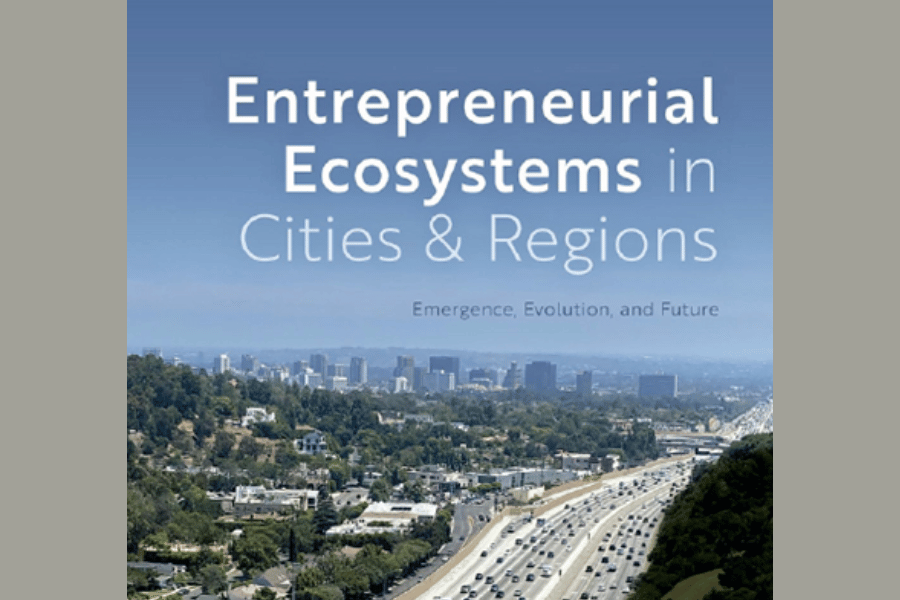Professor Fumi Kitagawa provides an overview of the edited volume published by Oxford University Press: Entrepreneurial Ecosystems in Cities and Regions: Emergence, Evolution and Future, with her co-editors – Robert Huggins, Daniel Prokop (Cardiff University), Christina Theodoraki (TBS Business School) and Piers Thompson (Nottingham Trent University).
Entrepreneurial Ecosystems in Cities and Regions
Over the last decade, there has been growing interest in the concept of entrepreneurial ecosystems as a means of better explaining the success or otherwise of cities and regions. From both a scholarly and policy perspective entrepreneurial ecosystems are considered to be a way of re-energising economies – particularly in the wake of multiple crises – as well as sustaining previous success or avoiding stagnation and relative decline. The body of research on entrepreneurial ecosystems is building rapidly, and concerns have been raised about the use of the term entrepreneurial ecosystems in a way that places it in danger of losing its focus and therefore its meaning. This book, therefore, seeks to ensure that the notion of entrepreneurial ecosystems does not become consigned to the dustbin of redundant scholarly concepts.
To achieve this, the aim of this edited volume is to bring together the wide-ranging intellectual explorations on the notion of ecosystems of entrepreneurship within cities and regions. The book – consisting of 28 chapters with over 60 contributors – is the result of a series of truly collaborative initiatives that have resulted in the emergence and evolution of an international ecosystem of scholars across cities, regions, countries, and continents, pointing to the future avenues of such scholarly endeavours. The chapters within the book are curated into three parts covering the emergence, evolution, and future of the concept and the research that seeks to provide us with a better understanding of how it can be appropriately and usefully applied.
The book presents an agenda building upon the early explosion of interest within academic, policy, and practice circles by providing new and important insights contributing to knowledge, directing future investigations, and increasing the effectiveness of research-based policy and practice. In essence, it develops a framework and evidence base for establishing a robust and sustainable concept that can help shape a fuller understanding of how cities and regions around the world can use entrepreneurship and innovation as a catalyst for their future economic, social, and environmental development.
The Emergence of Entrepreneurial Ecosystems
In Part I of this volume, the eight chapters (Geoffrey Borchhardt and Olav Sorenson; Michael Fritsch, Maria Greve, Michael Wyrwich; Meiling Hong and Ben Spigel; Colin Mason; André Nana, Eric Michaël Laviolette, Christina Theodoraki; Shauna Brail and Shiri Breznitz; David B. Audretsch and Christina Theodoraki; Maryann Feldman and Joonho Oh) focus on the emergence of the entrepreneurial ecosystem both as a concept and phenomenon. The chapters investigate what we know about entrepreneurial ecosystems and what we do not know, and depict what entrepreneurial ecosystems are—the types of actors and factors associated with entrepreneurial activities—and how and why ecosystems can increase the performance and survival of entrepreneurial firms. These chapters open up discussions on the conceptual underpinnings of the entrepreneurial ecosystem, given the diverse role of heterogeneous actors within them. As these chapters indicate, the ‘contexts’ for entrepreneurship vary across places resulting in a spatial diversity of policies. The configurations of the ecosystem also vary with temporal changes. For instance, a significant increase in the number of entrepreneurial actors interacting and providing support, mentoring, and resources on a collaborative basis may result in a positive entrepreneurial culture emerging over time. This may lead to questions such as: how does a regional culture of entrepreneurship emerge and what can policy do to stimulate the development of such a culture?
The Evolution of Entrepreneurial Ecosystems
In Part II of this volume, the ten chapters (Mirella Theresia Schrijvers, Niels S. Bosma, and Erik Stam; László Szerb, Esteban Lafuente, and Éva Komlósi; Max Herbertson and Neil Lee; Hiroyuki Okamuro, Fumi Kitagawa, Hiro Izushi; Janna Alvedalen and Bo Carlsson; Katharina Scheidgen and Michaela Hruskova; Yasuyuki Motoyama; Elizabeth A. Mack, Heike Mayer, Isabella A. Catalano; Aki Harima; Andrew Johnston) examine the evolution of entrepreneurial ecosystems. Entrepreneurial dynamics are not necessarily well understood, especially in understudied contexts such as peripheral places. Furthermore, the literature to date requires a greater engagement with the methodologies and metrics to study the evolutionary aspects of entrepreneurial ecosystems, encouraging plurality that leads to novel methods that help disentangle the inherent complexities. The contributions to this part of the book offer a significant advancement of our understanding of the evolution of entrepreneurial ecosystems in addressing relevant questions and challenges. In particular, the evolution of the entrepreneurial ecosystems concerns research questions related to change and dynamics, with a key focus on the following issues: How do different attributes and elements develop, and when? How do networks of actors build their relations and coherence, and how do these networks expand, mutate, and dissipate at different stages of entrepreneurship development? How does entrepreneurial entry and growth differ across entrepreneurial ecosystems at different stages of development? How do governance structures determine entrepreneurial ecosystem evolution?
The Future of Entrepreneurial Ecosystems
In Part III, the nine chapters (Martin Bliemel, Allan O’Connor, Lisa Daniel, Saskia de Klerk, Margarietha de Villiers Scheepers, Morgan Miles; Richard T Harrison and Augusto Rocha; Rhiannon Pugh, Jana Schmutzler De Uribe, Manuel Gonzalo; Agata Kapturkiewicz and Heli Helanummi-Cole; Allan O’Connor, Rob Hallak, Claudine Soosay, Joe Mandrell; Robert Huggins, Yuxi Zhao, Piers Thompson; Haifeng Qian and Wenying Fu; Thomas S. Lyons and Dustin Holmes; Jonathan Potter and Helen Lawton Smith) address the future of the entrepreneurial ecosystems concept. While past and present studies have been mainly focused on definitions, challenges, and the fundamental composition of an entrepreneurial ecosystem, it is argued that future developments should stress its dynamic and interdisciplinary nature. The latter offers various perspectives, including social interactions, demographic considerations (such as women and immigrants), governance approaches, systemic analyses, evolutionary dynamics, holistic views, and strategic angles. The aim of Part III of the book is to provide a critical overview of the state-of-the-art entrepreneurial ecosystem research stream and reveal selected future avenues on promising topics to advance scholarly and policy-oriented discussion. Specifically, the future of entrepreneurial ecosystems hinges on the following questions: What spatial and context specificities shape entrepreneurial ecosystems? How do the micro-dynamics and interdependencies within the entrepreneurial ecosystem contribute to the agency of actors and foster value creation and productive entrepreneurship? How do typologies, contextual factors, and spatial specificities contribute to understanding the trajectories and outcomes of entrepreneurial ecosystems?
The journey of the book
It is worthwhile mentioning the original roots of the book. It was initiated as part of a research project funded by the UK’s Economic and Social Research Council. The project ran between 2019 and 2021 and it sought to address the topic of ‘Entrepreneurial and Innovation Ecosystems in the UK and Japan: Place-Based Policy Scenarios and Options’. The first workshop, on ‘Measuring Entrepreneurial and Innovation Ecosystems’, was hosted by Adam Smith Business School at the University of Glasgow in collaboration with the University of Edinburgh Business School; and the second workshop, ‘Place-Based Ecosystems: Making Connections between Entrepreneurship and Innovation’, was held in Tokyo, hosted by the National Graduate Institute for Policy Studies (GRIPS), enabling a close dialogue to emerge between academic, policy, and business representatives across the two countries. Throughout the two workshops, it became apparent that more a granulated understanding of ecosystem thinking is required, with greater consideration of the institutional context given the heterogeneous nature of places and complex interactions between actors and networks.
Building on the UK–Japan collaborative efforts, the project team at Cardiff University took a new initiative to further share, exchange, and develop research and ideas concerning the entrepreneurial ecosystem concept across a wide range of stakeholders. Hosted by Cardiff University’s School of Geography and Planning and Centre for Innovation Policy Research, a series of online workshops were held in the spring of 2021 under the theme ‘The Evolution, Persistence and Success of Entrepreneurial Ecosystems’. The online format of the workshop series not only enabled the team to overcome the restrictions in place due to COVID-19, but also opened up geographical boundaries through international exchange and networking. Across the five workshops, more than 200 participants from a wide range of locations were engaged. The workshop series created energy and enthusiasm, attracting many PhD students and early career researchers, as well as more experienced academics, along with policymakers, entrepreneurs, and investors.
The set of presentations and discussions from these workshops (both online and in-person) between 2019 and 2021 laid the foundation for the edited volume through an extended network of international scholars. As a whole, the chapters in this edited volume provide a wealth of new insights on the concept of entrepreneurial ecosystem shedding light on a range of questions as indicated above. These questions provide a deeper understanding of the entrepreneurial process as a socially embedded phenomenon that is of huge global significance in the twenty-first century. The extent to which cities and regions can remain resilient and sustainable within a global economic environment with growing geopolitical upheaval will be a fundamental factor determining global economic evolution, and entrepreneurship and the ecosystems through which it occurs will undoubtedly play a major role.
This blog was written by Professor Fumi Kitagawa, Chair in Regional Economic Development, City-REDI / WMREDI, University of Birmingham.
Disclaimer:
The views expressed in this analysis post are those of the authors and not necessarily those of City-REDI or the University of Birmingham.



